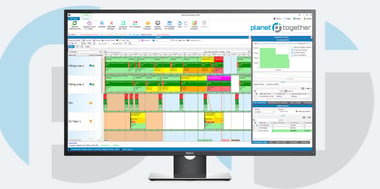Integration for Adaptive Scheduling and Efficient Manufacturing
Production planning plays a pivotal role in medical manufacturing. Every decision made by a production planner affects the entire manufacturing process, from sourcing raw materials to delivering life-saving medical devices. However, the complexity of modern supply chains and the need for adaptive scheduling present significant challenges.
In this blog, we'll look into the importance of integration between advanced planning and scheduling (APS) systems like PlanetTogether and enterprise resource planning (ERP), supply chain management (SCM), and manufacturing execution systems (MES) such as SAP, Oracle, Microsoft, Kinaxis, and Aveva.
We'll explore how this integration empowers production planners to optimize operations, streamline processes, and ultimately deliver high-quality medical products efficiently.

The Role of a Production Planner
Production planners are responsible for creating schedules, coordinating resources, and ensuring that production runs smoothly to meet demand while minimizing costs and maintaining quality standards. They must navigate various constraints such as machine capacity, labor availability, and material availability while adhering to regulatory requirements and customer deadlines.
In the world of medical manufacturing, where demand fluctuates and product lifecycles are short, the ability to adapt quickly and make informed decisions is crucial.
The Need for Adaptive Scheduling
Traditional manufacturing planning systems often rely on static schedules that are created weeks or even months in advance. However, in the dynamic environment of medical manufacturing, where demand can change rapidly due to factors such as new product launches, regulatory changes, or unexpected events like pandemics, static schedules quickly become obsolete. Adaptive scheduling, on the other hand, allows production planners to dynamically adjust schedules in real-time based on changing conditions, ensuring that production remains efficient and responsive to market demands.

Enter Advanced Planning and Scheduling (APS) Systems
Advanced Planning and Scheduling (APS) systems like PlanetTogether are designed to address the challenges of modern manufacturing by providing production planners with powerful tools to optimize scheduling, resource allocation, and capacity planning. These systems use sophisticated algorithms to generate feasible production schedules that take into account various constraints and objectives, allowing planners to make data-driven decisions quickly. However, to fully leverage the capabilities of APS systems, integration with ERP, SCM, and MES systems is essential.
-Apr-01-2024-01-39-55-8668-PM.png?width=282&height=45&name=logo%20(2)-Apr-01-2024-01-39-55-8668-PM.png)

Integration: Bridging the Gap
Integration between APS and ERP, SCM, and MES systems enables seamless data exchange and real-time visibility across the entire supply chain and manufacturing process. By connecting systems such as PlanetTogether with SAP, Oracle, Microsoft, Kinaxis, Aveva, and others, production planners can access accurate and up-to-date information on inventory levels, production capacity, and order status, allowing them to make informed decisions and respond quickly to changes in demand or supply.
Benefits of Integration
Real-Time Data Visibility: Integration enables production planners to have a real-time view of inventory levels, production schedules, and resource availability across the entire supply chain, allowing them to identify bottlenecks and allocate resources more effectively.
Improved Decision-Making: By having access to accurate and up-to-date information, production planners can make informed decisions quickly, such as expediting orders, reallocating resources, or adjusting production schedules to meet changing demand.
Streamlined Processes: Integration eliminates the need for manual data entry and reconciliation between systems, reducing errors and streamlining processes. This frees up time for production planners to focus on strategic tasks rather than administrative work.
Enhanced Collaboration: Integration facilitates communication and collaboration between different departments within the organization, such as production, procurement, and logistics, enabling better coordination and alignment of goals.
Adaptive Scheduling: Integration allows APS systems like PlanetTogether to dynamically adjust production schedules based on real-time data from ERP, SCM, and MES systems, ensuring that production remains responsive to changes in demand or supply.
Implementation Considerations
While the benefits of integration are clear, implementing integration between APS and ERP, SCM, and MES systems requires careful planning and execution. Here are some key considerations:
Compatibility: Ensure that the APS system and ERP, SCM, and MES systems are compatible and can exchange data seamlessly. This may require custom development or the use of middleware solutions.
Data Quality: Data accuracy and consistency are critical for effective integration. Establish data governance processes and procedures to ensure that data is clean, accurate, and up-to-date across all systems.
Security: Implement robust security measures to protect sensitive data and ensure compliance with regulatory requirements, such as HIPAA for medical manufacturing.
Training and Support: Provide training and support to production planners and other stakeholders to ensure that they understand how to use integrated systems effectively and maximize their benefits.
Integration between advanced planning and scheduling (APS) systems like PlanetTogether and ERP, SCM, and MES systems is essential for adaptive scheduling and efficient manufacturing in the medical industry. By seamlessly connecting these systems, production planners can access real-time data, streamline processes, and make informed decisions quickly, ultimately improving operational efficiency and delivering high-quality medical products to market faster.
As the pace of change accelerates and competition intensifies, integration will continue to play a crucial role in driving innovation and success in medical manufacturing.
In medical manufacturing, the ability to adapt quickly and make informed decisions is crucial. Integration between advanced planning and scheduling (APS) systems like PlanetTogether and ERP, SCM, and MES systems enables production planners to optimize operations, streamline processes, and ultimately deliver high-quality medical products efficiently.
By seamlessly connecting these systems, production planners can access real-time data, improve decision-making, and respond quickly to changes in demand or supply. Are you ready to take your manufacturing operations to the next level? Contact us today to learn more about how PlanetTogether can help you achieve your goals and drive success in your industry.